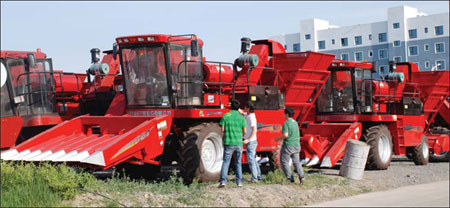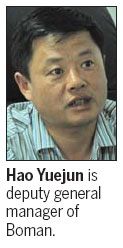
|
 |
|
Harvesters manufactured by Xinjiang Boman Agricultural Machinery Company in Urumqi. [Photo/China Daily] |
With one market near saturation, a new strategy takes effect
Xinjiang Uygur autonomous region has deep roots in agriculture and was one of the first parts of China where agricultural machinery was used. In fact, Xinjiang Boman Agricultural Machinery Company, a major agricultural machinery manufacturer in Xinjiang, has been so successful there that it now needs to find other areas of the country to sow its seeds.
About 2,000 kilometers from the sea, Xinjiang is dry and has plenty of sunshine all year round, which is optimal for produce such as wheat, cotton, corn and grapes.
Boman was born and bred in this territory. Set up in 2006, it is a subsidiary of Xinjiang Machinery Research Co, and sells products under the brand name Moshine.
Over the past three years as mechanization has continued its march across the farmlands of China, Boman has watched its sales figures soar.
Last year its revenue reached 380 million yuan ($60 million, 48.56 million euros), a rise of 52 percent on the year before. About 90 percent of that revenue came from corn and forage harvesters.

Hao Yuejun, deputy general manager of Boman, estimates that revenue will reach 500 million yuan this year.
The company is one of the largest agricultural machine makers in Xinjiang, and its sales accounted for one-third of the region's market last year.
Some of that success, and the spoils that are ready to fall into Boman's basket, can no doubt be attributed to the fact that the company is simply making hay while the sun shines.
"The government has decided to raise the machinery-harvest ratio of major crops such as wheat to 90 percent, from the current 30 to 40 percent, so the agricultural machinery industry has great market potential," Hao says.
But there is only so much arable land, and in Xinjiang full cultivation potential has been reached in recent years.
Almost every big farm has bought machinery, Hao says, and the Xinjiang market will be saturated within one or two years.
Given that the machinery has a useful life of about 10 years, for the manufacturers the lucrative business of plant replacement remains a distant dream. That means it must look for markets further afield.
That wider perspective is now showing up in its sales figures. In 2009 the company sold 180 machines, 40 of those outside Xinjiang; last year 600 machines were sold, half of them outside Xinjiang.
Products sold outside of the region mainly went to Inner Mongolia autonomous region and Northeast China, the company says.